2020 at a glance
January
Eurojust takes over as chair of the network of
Justice and Home Affairs (JHA) Agencies

The Justice and Home Affairs (JHA) agencies’ network has an important role to play in Europe. Its work helps ensure that the EU is well equipped to deal with security, justice, fundamental rights and gender equality.
The network includes nine agencies: CEPOL, EASO, EIGE, EMCDDA, eu-LISA, Eurojust, Europol, FRA and Frontex. In 2020, Eurojust hosted the network, coordinating its activities and carrying out the secretariat function.
28 January
The 5th Cybercrime Judicial Monitor is
published, focusing on virtual currencies

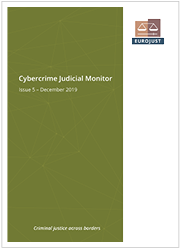
The Cybercrime Judicial Monitory (CJM), published once a year, is produced by the European Judicial Cybercrime Network (EJCN) and distributed to judicial and law enforcement authorities active in fightlng cybercrime and cyber-enabled crime. The focus of this issue of the CJM is the ‘handling of virtual currencies in criminal investigations and proceedings’, looking at the legal framework and policies in different countries, and the challenges and obstacles encountered when seizing and possibly converting virtual currencies at different stages of an investigation.
11 February
The European Data Protection Supervisor
(EDPS) pays a first visit to Eurojust


This first official visit by the EDPS followed the introduction of a new data protection regime at Eurojust on becoming an official EU Agency in December 2019.
Working on the frontline of investigations and prosecutions, Eurojust comes into regular contact with operational personal information. On a more general level, it processes various categories of personal data as part of its daily administrative activities. Eurojust applies the highest standards in data protection, ensuring that the rights of individuals are fully protected at all times.
10 March
Gordana Janićijević is appointed first Liaison
Prosecutor for Serbia at Eurojust

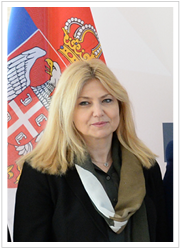
Ms Janicijevic’s appointment followed the signing of a cooperation agreement between Eurojust and Serbia in November 2019.
Liaison Prosecutors come from countries outside the EU and are posted at Eurojust on the basis of an international agreement. They work side by side with their colleagues from Member States to provide support in cross-border investigations involving their country, have access to Eurojust’s operational tools and facilities, and may participate in operational and strategic meetings.
» read more on Serbia-Eurojust cooperations
» Liaison Prosecutors at Eurojust

mid-March
Eurojust begins applying remote working arrangements in response to the COVID-19 pandemic
The COVID-19 crisis has been a challenge for society and the judiciary across the European Union. Eurojust continues to be fully operational in assisting prosecutors in all Member States, ensuring that cross-border crime is tackled and decisive action is taken against criminals taking advantage of the situation.

Eurojust and the European Judicial Network start providing weekly overviews to Member States, showing the impact of the COVID-19 crisis on judicial cooperation, including the implementation of European Arrest Warrants, Investigation Orders, freezing and confiscation orders and joint investigation teams
The information compiled by Eurojust and the EJN on the impact of measures taken by governments to combat the spread of COVID-19 outlines, inter alia, how major EU instruments on judicial cooperation in criminal matters (European Arrest Warrant, European Investigation Order, transfer of sentenced persons, and confiscation and freezing orders) are applied in practice during the COVID-19 crisis.
Executive summaries of these reports are publicly available in the Council’s document register under the number ‘7963’, and on the Eurojust and EJN websites.
30 March
A new version of the country-by-country overview on the position of public prosecutors in relation to the European Arrest Warrant is published

First published in July 2019, this practical tool – based on a compilation of replies to a questionnaire – was drawn up by Eurojust, the European Judicial Network and the Council to help judicial authorities act correctly in light of groundbreaking rulings by the European Court of Justice (CJEU) on the issuance of European Arrest Warrants and surrender procedures between Member States. The updated overview provides a summary of the CJEU’s judgments and contains a compilation of replies from Member States, the United Kingdom and Norway.
» read/download the full document
» translated executive summaries

1162 new cases are registered at Eurojust in the first quarter of 2020
May
Several key reports are published: Case law overview on ne bis in idem, Case law overview on the European Arrest Warrant, Third JIT evaluation report, and the report on Cumulative prosecution of foreign terrorist fighters for core international crimes and terrorist offences

Case law by the Court of Justice of the European Union on the principle of ne bis in idem in criminal matters is an update to a previous edition published in 2017. It contains summaries of the CJEU’s judgments, categorised according to a set of important keywords that reflect the main elements of the principle of ne bis in idem.
» read/download full report
» translated executive summaries
Case law by the Court of Justice of the European Union on the European Arrest Warrant is an update to a previous edition published in 2018. It contains summaries of the CJEU’s judgments categorised according to a set of important keywords that reflect the structure of the European Arrest Warrant (EAW) and the surrender procedures between Member States. Topics discussed include: content, validity and lawfulness of the EAW, admissibility of a request for a preliminary ruling, scope of the EAW, obligation to execute an EAW, human rights scrutiny and more.
» read/download full report
» translated executive summaries
The Third JIT evaluation report presents the findings of 99 evaluations completed by joint investigation team (JIT) practitioners between November 2017 and November 2019. The report also addresses Eurojust’s experience in JITs with third States. Lessons learned and best practices are identified for different phases of a JIT, from the set-up phase, to the operational phase and prosecution phase.
» read/download full report
» translated executive summaries
Cumulative prosecution of foreign terrorist fighters for core international crimes and terrorist-related offences discusses opportunities for investigating and prosecuting foreign terrorist fighters not only for terrorist offences but also for war crimes, crimes against humanity and the crime of genocide (core international crimes). It presents existing jurisprudence and developing practice by national authorities.
» read/download full report
» translated executive summaries
23 May
5th EU Day against impunity for genocide, crimes against humanity and war crimes

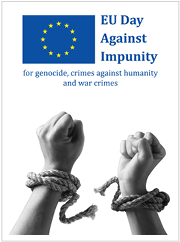
Due to the health crisis caused by COVID-19, EU Day 2020 against impunity was organised digitally, with all presentations made available on Eurojust’s YouTube channel. The focus of the event and of a report presented on this occasion was on the cumulative prosecution of foreign terrorist fighters for core international crimes and terrorism-related offences. The event was co-organised by the Croatian Presidency of the EU, the European Commission, Eurojust and the Network for investigation and prosecution of genocide, crimes against humanity and war crimes.
29 May
Eurojust launches the Focus Group on Migrant Smuggling, which
brings together specialised prosecutors from EU Member States

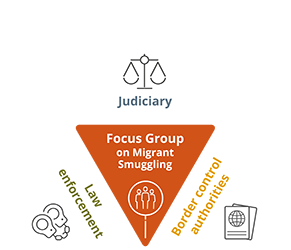
To further strengthen the fight against migrant smuggling, Eurojust supports a Focus Group for Prosecutors on Migrant Smuggling. The network serves as an important hub, connecting Member State actors responsible for tackling migrant smuggling crimes, with a view to sharing best practices, analysing trends and developments in the operational tactics of organised crime groups active in migrant smuggling, studying the impact of shifts in migrant smuggling routes, and gathering information on the challenges and opportunities of judicial cooperation.
2 June
Eurojust signs an agreement with IberRed on access to its
Secure Information System for Latin America


The agreement signed with the Ibero-American Network of International Legal Cooperation (IberRed) on the use of its Iber@ Secure Communication System gives National Desks at Eurojust safe and direct access to their contact points in Latin America, who are experienced judges, prosecutors and central authorities with competence in international legal cooperation matters in their countries. Eurojust and IberRed signed a Memorandum of Understanding in 2009, establishing effective cooperation with Latin American judicial authorities.


4 June
Eurojust’s President updates JHA ministers on the
Agency’s response to the COVID-19 crisis
Addressing the European Justice and Home Affairs (JHA) Council, Eurojust President Ladislav Hamran spoke of measures taken to ensure full business continuity of Eurojust during the pandemic and its readiness to assist Member States with requests for judicial cross-border cooperation. He also stressed that COVID-19 has reinforced the need for “a profound digitalisation of judicial cooperation in criminal matters”.
11 June
The European Judicial Cybercrime Network holds a
meeting focused on support to victims of malware


Cybercrime is a priority area for Eurojust, with a growing number of cases being opened. As part of efforts to develop a greater understanding of and best practices around this complex crime area, and to increase the efficiency of related investigations and prosecutions, Eurojust hosts the European Judicial Cybercrime Network (EJCN). Established in 2016, the EJCN fosters dialogue and exchanges of expertise among practitioners specialised in fighting cybercrime and cyber-enabled crime.
» read more about the meeting
» EJCN
» cybercrime casework at Eurojust
12 June
Giorgi Gogadze is appointed first Liaison
Prosecutor for Georgia at Eurojust


Mr Gogadze’s appointment followed the signing of a cooperation agreement between Eurojust and Georgia in May 2019.
Liaison Prosecutors come from countries outside the EU and are posted at Eurojust on the basis of an international agreement. They work side by side with their colleagues from Member States to provide support in cross-border investigations involving their country, have access to Eurojust’s operational tools and facilities, and may participate in operational and strategic meetings.
» read more on Georgia-Eurojust cooperation
» Liaison Prosecutors at Eurojust

845 new cases are registered at Eurojust in the second quarter of 2020
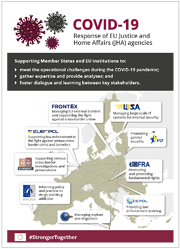

15 July
The JHA agencies network publish a joint paper
on the agencies’ response to COVID-19
From the start of the COVID-19 pandemic, the nine Justice and Home Affairs (JHA) agencies (CEPOL, EASO, EIGE, EMCDDA, eu-LISA, Eurojust, Europol, FRA and Frontex) supported Member States and EU institutions in meeting the unprecedented challenges resulting from the outbreak of the virus - each agency in its respective area of work. The agencies' individual and joint efforts to deal with the impact of the pandemic were captured in a joint paper.
1 September
Jo Christian Jordet is appointed Liaison
Prosecutor for Norway at Eurojust


Norway was the first country to post a Liaison Prosecutor at Eurojust in September 2005, and has since played a very active role in judicial cooperation with the Agency. Mr Jordet is the latest Liaison Prosecutor to head the Norwegian team at Eurojust.
Liaison Prosecutors come from countries outside the EU and are posted at Eurojust on the basis of an international agreement. They work side by side with their colleagues from Member States to provide support in cross-border investigations involving their country, have access to Eurojust’s operational tools and facilities, and may participate in operational and strategic meetings.
» read more on Norway-Eurojust cooperation
» Liaison Prosecutors at Eurojust
15 September
The 2020 Memorandum on Battlefield Evidence is published

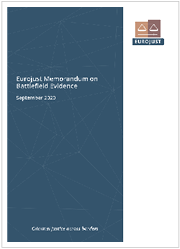
Battlefield evidence, such as photos depicting crimes committed against civilians, fingerprints on explosive devices and e-mails describing terrorist plots, is increasingly being used to prosecute suspects of terrorism and core international crimes, including returning foreign terrorist fighters. The 2020 Memorandum on Battlefield Evidence shows that while there are many challenges in obtaining such data and making sure it meets the criteria for admissible evidence, it has paved the way for bringing terrorist suspects to trial.
22 September
Eurojust joins the EU Victims’ Rights’ Platform

At the conference EU Strategy on Victims’ Rights 2020-2025, jointly organised by the European Commission and German Presidency of the EU on 22 September 2020, Eurojust announced that it would step up its engagement for victims’ rights and take an active part in the Victims’ Rights Platform inaugurated on the same day.
The partners of this platform, which include the European Network on Victims' Rights, the EU Network of National Contact Points for Compensation, the EU Counter-Terrorism Coordinator, Eurojust, the European Union Agency for Fundamental Rights and civil society, will serve as an important forum for discussions on victims' rights with all relevant actors.

858 new cases are registered at Eurojust in the third quarter of 2020
7 October
Eurojust announces the hosting of the
EuroMed Justice Programme


EuroMed Justice is European Commission funded, capacity-building programme designed to strengthen judicial cooperation in criminal matters between EU Member States, South Partner Countries (SPC) – Algeria, Egypt, Israel, Jordan, Lebanon, Libya, Morocco, Palestine* and Tunisia – and EU Justice and Home Affairs Agencies. Its overall objective is “to contribute to protecting the EU neighbouring countries' citizens against criminal activities, respecting the rule of law and fundamental human rights.”
The hosting of EuroMed Justice at Eurojust marks an important turning point for the Agency, as it is the first time it implements a programme outside EU borders. A dedicated team of experts operating from Eurojust in The Hague began rolling out the next phase of the Programme in late 2020. The special experience and input of Eurojust, the EJN and the JITs Network Secretariat make it possible to explore avenues for closer cooperation with SPC.
8 October
Counter-terrorism experts take stock of the
Counter-Terrorism Register

The European Judicial Counter-Terrorism Register (CTR) was launched at Eurojust on 1 September 2019, on the basis of Council Decision 2005/671/JHA. The register centralises judicial information on counter-terrorism proceedings from all EU Member States, and enables Eurojust to proactively support the national judicial authorities in identifying links between investigations and coordinating them more efficiently.
In the meeting of 8 October, participants discussed progress made with information sharing via the CTR and further ways to strengthen cooperation.
11 October
Ladislav Hamran is re-elected as
President of Eurojust


Elected from among the National Members, the President represents the Agency, oversees meetings and directs and monitors Eurojust’s activities and management.
National Member for the Slovak Republic at Eurojust since 2007, Mr Hamran was first elected President in 2017 and re-elected for a second 4-year term in October 2020.
The digitalisation of justice in the EU was one of the focal points of Mr Hamran’s first term as President and continues to be a key focus at Eurojust.
» read more about Mr Hamran’s re-election
» the Eurojust Presidency
November
Eleni Kouzoupi is appointed National Member for Cyprus, and
José de la Mata Amaya is appointed National Member for Spain



November 2020 saw the arrival of the new National Member for Cyprus. Ms Eleni Kouzoupi succeeded Ms Katerina Loizou, who had served as National Member for Cyprus since 2005.
November 2020 saw the arrival of the new National Member for Spain at Eurojust. Mr José de la Mata Amaya succeeded Mr Francisco Jiménez-Villarejo, who returned to his home country after serving as National Member for 8 years.
9 November
The Report on national legislation and Eurojust
casework analysis on sham marriages is adopted

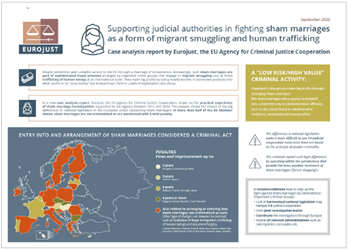
Sometimes people gain unlawful access to the European Union through a marriage of convenience. Increasingly, such sham marriages are part of sophisticated fraud schemes arranged by organised crime groups, engaging in migrant smuggling and trafficking of human beings on an international scale. Sham marriages are also a direct abuse of the fundamental right to freedom of movement within the EU, often creating unjustified access to the European labour market and social security benefits in the Member States. Since 2012, the European Union has firmly stressed the importance of effective cooperation in tackling marriages of convenience.
In this case analysis report, Eurojust draws on the practical experiences of sham marriage investigations supported by the Agency between 2012 and 2020.
10 November
Eurojust presents a first report on its casework in
the field of the European Investigation Order


The Report on Eurojust’s casework in the field of the European Investigation Order aims to inform practitioners and policymakers of the main difficulties encountered in the practical application of the European Investigation Order (EIO) and highlight, where relevant, the role that Eurojust has played in overcoming such difficulties. The report is primarily based on the analysis of cases addressing issues related to the EIO, registered at Eurojust between May 2017 and May 2019, and is complemented by views expressed in dedicated discussions with some Eurojust National Desks.
The JITs network of national experts hold their 16th annual meeting, focusing on digital tools for joint investigation teams

The 16th annual meeting of national experts on joint investigation teams (JITs), held via videoconference on 10 November 2020, focused on the need to further digitalise cross-border judicial cooperation, as evidenced by challenges experienced during the COVID-19 pandemic. The national experts focused in particular on the need to have a secure and fast exchange of information and evidence within the scope of a JIT.
17 November
Boštjan Škrlec is elected Vice-President of Eurojust


Vice-Presidents at Eurojust carry out duties entrusted to them by the President and represent the President if the latter is prevented from carrying out his/her duties.
Elected Vice-President by his peers in the College of Eurojust, Mr Boštjan Škrlec is serving a mandate of four years in this capacity, while he continues to represent the Slovenian judiciary in his capacity as National Member.
» read more about Mr Škrlec’s election
» the Eurojust Presidency
20 November
Eurojust chairs the virtual annual meeting of Heads of JHA Agencies, focusing on artificial intelligence and digitalisation

On the occasion of their annual meeting, held virtually due to the COVID-19 pandemic, the Heads of the Justice and Home Affairs (JHA) Agencies had a first exchange on artificial Intelligence and digital capacity building, training tools and innovative learning. With the COVID-19 crisis serving as a catalyst for teleworking and videoconferencing, the agencies agreed to explore avenues for closer cooperation in order to shape the digital future of law enforcement, border management and justice that respects fundamental rights.
Eurojust has made digitalisation a priority for the coming years.
December
Several key reports are published: joint Europol-Eurojust-EJN
SIRIUS EU digital evidence situation report, the joint Eurojust-EJN
Report on the extradition of EU citizens to third countries,and the
2019 Eurojust report on counter-terrorism




The SIRIUS EU Digital Evidence Situation Report outlines the status of EU authorities in retrieving electronic data held by foreign-based online service providers. The report is based on extensive information gathered from over 300 surveyed officials of EU Member States’ law enforcement and judicial authorities, together with relevant input from a dozen major online service providers and references to national legislation.
The Joint report of Eurojust and the European Judicial Network on the extradition of EU citizens to third countries presents the findings of an analysis of how cases of requests for extradition of EU citizens by third countries are handled in practice. The report confirms that the application of CJEU case-law on the extradition of EU citizens raises several practical and legal issues, and that Eurojust and the EJN have played an important role in facilitating cooperation between Member States involved, and sometimes also with third countries.
The 2019 Eurojust Report on Counter-Terrorism presents Eurojust’s activities in the area of counter-terrorism (CT) in 2019. It provides insights into the growing number of complex and diverse CT investigations and prosecutions coordinated by Eurojust, identifies challenges and best practices and refers to examples of the assistance that Eurojust provided to national authorities.

1 December
Eurojust’s response during the COVID-19 pandemic is presented to the inter-parliamentary committee of the European and national parliaments
This meeting, held virtually, was the first time since the Eurojust Regulation became applicable in December 2019 that Members of the European Parliament and national parliaments of the Member States convened to evaluate the Agency’s activities.
The Committee was brought up to date on Eurojust’s response to the COVID-19 pandemic and continued operational work, informed of plans for future cooperation with the European Public Prosecutor’s Office, and presented a recent case illustrating the added value of Eurojust’s international network in cross-border investigations and the important role that Liaison Prosecutors play in ensuring operational success.
2 December
Eurojust embraces the European Commission’s
proposals for the digitalisation of justice

The Communication on the Digitalisation of Justice in the EU, presented by the European Commission on 2 December, addressed several aspects crucial to ensuring successful investigations of serious cross-border crime and terrorism in the digital age. These include updating the Eurojust Case Management System; establishing a task force to improve data exchanges between Eurojust and its partners; and establishing a Joint Investigation Teams Collaboration Platform.

1335 new cases are registered at Eurojust in the fourth quarter of 2020
2021
* This designation is not to be construed as recognition of a State of Palestine and is without prejudice to the individual positions of the Member States on this issue. (reference to 7 October entry on timeline)
